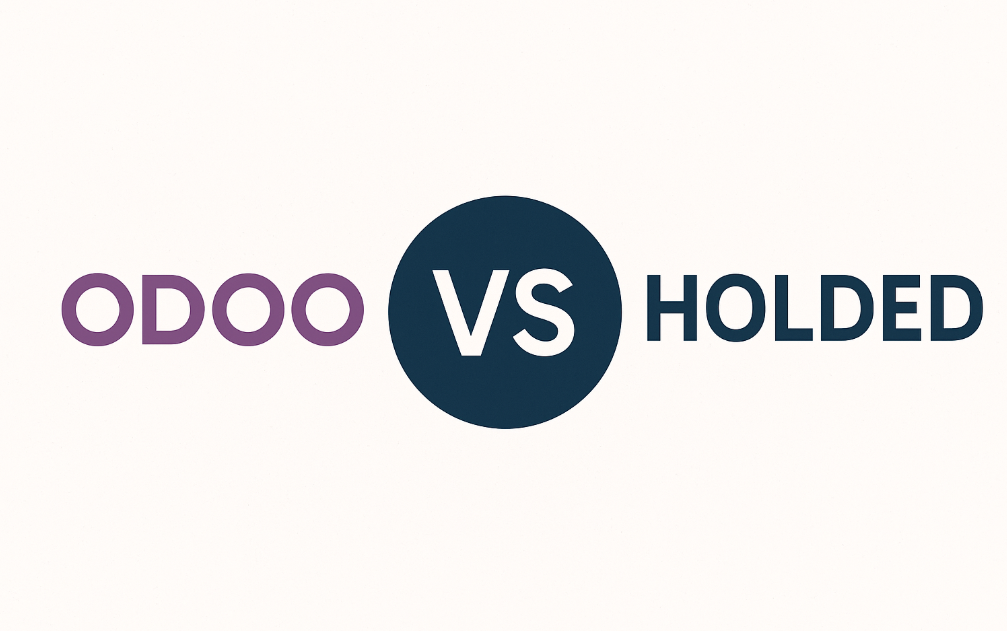Choosing the right management software is one of the most important decisions for any company looking to improve efficiency, reduce costs, and optimize daily operations. Two of the most popular platforms in this field are Odoo and Holded, each with its own advantages and disadvantages. Although they may seem similar at first glance, they are actually designed to address different business needs. In this article, we'll compare the two so you can decide which one best suits your business.
Odoo vs Holded: Main differences
AI Agent for your business FREE
For a limited time only! Try it for free! SintonaiMaximize your sales, reduce your costs, and improve your customers' experience with our intelligent chatbots.
Before going into details, it's important to understand what each platform offers:
| Feature | Odoo | Holded |
|---|---|---|
| Business model | Modular and flexible ERP, open source | All-in-one, closed SaaS |
| Scalability | High, ideal for SMEs and large companies | Media, focused on SMEs and freelancers |
| Ease of use | Steeper learning curve | Intuitive and quick to adopt interface |
| Price | From free to paid plans based on modules | Fixed-cost subscription models |
| Medium | Active community and official support | Direct and personalized support |
Functionality and modules
Odoo stands out for being a platform extremely modularThis means you can start with a basic module (such as CRM or invoicing) and then add others like inventory management, projects, human resources, marketing, or even e-commerce, depending on your business needs. This flexibility is ideal for growing businesses that don't want to change platforms every time they expand their operations.
Holded, on the other hand, is more compact, offering a predefined set of tools such as invoicing, accounting, project management, and CRM in a single package. Although it's less flexible, its simplicity is a major selling point for SMEs and freelancers looking for speed and ease of use without much initial setup.
Customization and scalability
The ability to customize is one of Odoo's strengths. Being a platform open source, allows developers to create custom modules or integrate third-party tools. This gives it a significant advantage for companies with unique processes or very specific needs. However, this can also require more time and resources to set up and maintain.
Holded, on the other hand, offers fewer customization options but stands out for its speed of implementation. Its features are designed to be easy to use from the start, reducing training time and facilitating employee adoption.
What are the disadvantages of Odoo?
Despite its great advantages, Odoo also presents some challenges:
AI Agent for your business FREE
For a limited time only! Try it for free! SintonaiMaximize your sales, reduce your costs, and improve your customers' experience with our intelligent chatbots.
- Learning curve: It is more complex to configure and use than Holded due to its modular nature.
- Additional costs: Although the community version is free, many advanced features require paid subscriptions.
- Requires customization: To get the most out of it, it often requires technical adjustments or even custom development.
- Maintenance: Updates can be complicated and may require specialized technical assistance.
Who is Odoo's competition?
Odoo isn't alone in the ERP market. Its main competitors include:
- SAP: One of the giants in the sector, ideal for large corporations with complex needs.
- Microsoft Dynamics 365: Powerful and well-integrated with other Microsoft products, but with a higher price tag.
- Zoho ERP: Similar to Odoo in terms of modularity, but with a lighter approach and more affordable prices.
- ERPNext: Another open source software, although with less adoption than Odoo.
- Holded: As we have seen, an excellent option for growing SMEs.
Why is Odoo not popular?
Despite being one of the most comprehensive and flexible ERPs on the market, Odoo isn't as popular as other giants like SAP or Microsoft Dynamics. Some reasons for this include:
- Complexity: Its flexibility also means it is more complicated to implement and maintain.
- Lower brand recognition: Although it is widely used, it does not have the same level of marketing as other competitors.
- Lack of standardization: Being open source, the quality of some modules developed by third parties may vary.
- Requires technical investment: Companies that do not have internal technical resources may find it challenging.
Which is better, SAP or Odoo?
Comparing SAP and Odoo is complicated because they are designed for different types of businesses. SAP is ideal for large companies that require a robust and highly structured ERP with deep integration across all business areas. On the other hand, Odoo is perfect for small and medium-sized businesses looking for flexibility and scalability without having to invest millions in licenses and maintenance.
💡 Note: If your business is small or medium-sized and you value adaptability and cost savings, Odoo may be a better option than SAP.
Conclusion: Which one should you choose?
The choice between Odoo and Holded depends primarily on the size of your business and your specific needs. If you're looking for a fast, easy-to-use solution without technical complications, Holded may be your best option. However, if you need customization, scalability, and full control over your ERP system, Odoo is undoubtedly a more powerful option in the long run.


